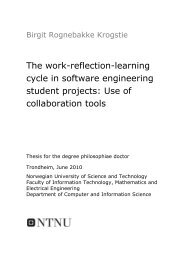Disputation Mikhail Fominykh - Department of Computer and ...
Disputation Mikhail Fominykh - Department of Computer and ...
Disputation Mikhail Fominykh - Department of Computer and ...
You also want an ePaper? Increase the reach of your titles
YUMPU automatically turns print PDFs into web optimized ePapers that Google loves.
CSCL at Work<br />
stories that address the particular needs <strong>of</strong> the individuals, leveraging the narrative building<br />
blocks imbued with the corporate experience <strong>of</strong> industry such as Siemens <strong>and</strong> Nokia.<br />
Games scenarios that are being developed are related to stakeholder management,<br />
negotiation scenarios, <strong>and</strong> cases involving sustainability issues. All scenarios are based on<br />
empirical material developed in the project consortium together with industry partners.<br />
The purpose <strong>of</strong> the TARGET project as a whole is to account for <strong>and</strong> incorporate in the<br />
in-service training programs the knowledge in a company that is crucial to the operation <strong>of</strong><br />
the business, but which at the same time is difficult to capture <strong>and</strong> to disseminate<br />
throughout generations <strong>of</strong> employees. In this project, learning at the workplace means to<br />
activate the ‘tacit knowledge’ <strong>of</strong> different employees <strong>and</strong> stakeholders about ‘project<br />
management’ (e.g., how to organize, coordinate projects).<br />
The data collected from industry partners Siemens <strong>and</strong> Nokia <strong>and</strong> university partner<br />
Norwegian University <strong>of</strong> Science <strong>and</strong> Technology gave the background material for what<br />
kinds <strong>of</strong> scenarios the consortium wanted to develop. In these organizations, project<br />
management courses have been <strong>of</strong>fered for a long time, <strong>and</strong> evaluation material from the<br />
courses was made available to the consortium. The material was analyzed within the<br />
threshold concept framework to deduct what the most difficult concepts in the<br />
development <strong>of</strong> competence in project management. In turn, these concepts were used to<br />
design the game scenarios, <strong>and</strong> incorporating the accumulated experience in the kind <strong>of</strong><br />
situations <strong>and</strong> challenges that the player shall experience. The main point here is that the<br />
content <strong>and</strong> game design is deeply rooted in the experience <strong>of</strong> the organizations that<br />
partake in the consortium. Furthermore, the game will be deployed in the very same<br />
organizations as a part <strong>of</strong> the ordinary in service training programs <strong>and</strong> teaching. In a very<br />
real sense, this is knowledge stemming from the workplace, developed <strong>and</strong> deployed in the<br />
workplace.<br />
TARGET International Summer School<br />
The TARGET International Summer School in Second Life acted as a forum for the<br />
presentation <strong>of</strong> innovative approaches, developments, <strong>and</strong> outcomes <strong>of</strong> research projects in<br />
the areas <strong>of</strong> technology-enhanced <strong>and</strong> workplace learning, serious games <strong>and</strong> collaborative<br />
technologies, facilitating the exchange <strong>of</strong> ideas between students, researchers <strong>and</strong><br />
practitioners. The design <strong>of</strong> the Summer School activities is intended to suggest<br />
possibilities as to facilitate reflective dialogue in communities.<br />
The virtual format <strong>of</strong> the Summer School demonstrated the possibilities <strong>of</strong> modern<br />
educational technologies for working <strong>and</strong> learning. Participants were able to unleash their<br />
creativity <strong>and</strong> express their ideas in a new way, demonstrating research projects to peers,<br />
experts <strong>and</strong> other visitors as well as getting feedbacks. Second Life was chosen as<br />
preliminary environment to demonstrate <strong>and</strong> try out different ideas <strong>and</strong> concepts within the<br />
TARGET framework. It was also used as a ‘pro<strong>of</strong>-<strong>of</strong>-concept’ in order to test out<br />
community seeding methodology proposed by the authors in the context <strong>of</strong> organizational<br />
learning in a highly diverse consortium. The diversity <strong>of</strong> this consortium that consisted <strong>of</strong><br />
several partners from both industry <strong>and</strong> academia provided yet another motivation for the<br />
organization <strong>of</strong> the Summer School, i.e. creating bridges between these different<br />
communities <strong>and</strong>, correspondingly, different approaches to learning.<br />
During the Summer School, we conducted a number <strong>of</strong> events <strong>and</strong> activities, both in a<br />
virtual environment <strong>and</strong> in real life. Virtual Campus <strong>of</strong> Norwegian University <strong>of</strong> Science<br />
<strong>and</strong> Technology (NTNU) in Second Life provided a venue for the virtual world part <strong>of</strong> the<br />
Summer School <strong>and</strong> a number <strong>of</strong> tools to support all the associated events.<br />
6
















